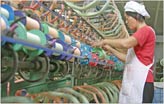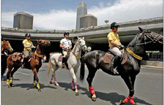Technology
China's investment in science hailed
Updated: 2011-06-10 15:06
(Xinhua)
BEIJING -- China is attempting to lure more foreign scientists to work in the country, while at the same time more foreign scientists seem willing to work in China.
"The facilities are excellent and the openness is wonderful," said Professor Theo Beckers from Tilburg University of the Netherlands, who attended a conference in Beijing on Thursday.
| ||||
Beckers has been in China for a two-month research program on environmental policies in collaboration with researchers from the Chinese Academy of Sciences (CAS).
More than 70 scientists from across the world shared their experiences on doing research in China at the conference.
Bai Chunli, president of the CAS, said at the conference that the academy considered international collaboration an inseparable part of its research and development.
"International cooperation is both an effective means for us to bring in, absorb and utilize the global scientific advancement, resources and talent for innovation, and a way for us to contribute to international science progress as well as to the tackling of various global challenges," he said.
Elizabeth Sawyer from the United Kingdom is working at the Institute of Biophysics under the CAS. She said China's massive economic growth and scientific output had made it "un-missable" for scientists who want to be at the research forefront.
"It is a very different culture overall, but people have been friendly and helpful," Sawyer said. "I have had a few difficulties with the language, but nothing else."
Since 2009, the CAS has strengthened projects aiming to promote exchanges between Chinese and foreign scientists, with a view of attracting foreigners to work in China.
In the following two years, the CAS approved the applications of 477 senior foreign scientists and 179 young fellows to come to China for research collaboration.
China's middle and long-term plan on science and technology states that the country will raise the proportion of research input to above 2.5 percent of gross domestic product by 2020.
Over the past five years, more than 2,500 projects have been launched on major scientific topics, such as China-developed aircraft and trans-genetic crops.
Specials

Wealth of difference
Rich coastal areas offer contrasting ways of dealing with country's development

Seal of approval
The dying tradition of seal engraving has now become a UNIVERSITY major

Making perfect horse sense
Riding horses to work may be the clean, green answer to frustrated car owners in traffic-trapped cities



